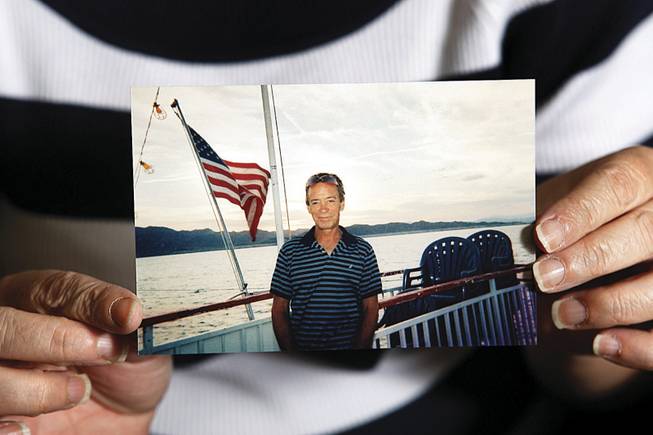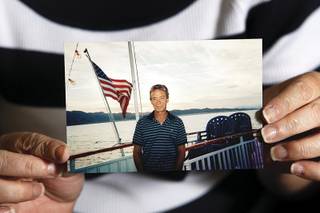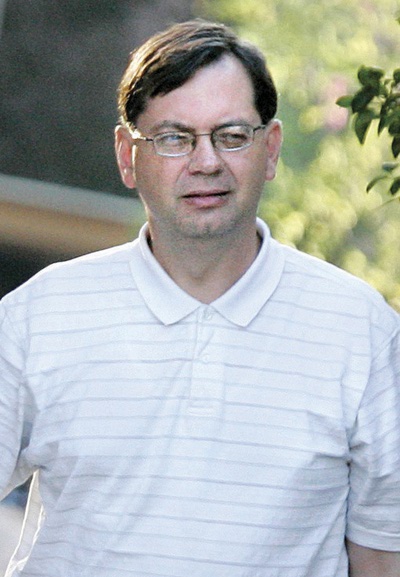
Mary Ann Reynolds holds a picture of her late husband, Robert, who had sought treatment for lower back pain. “I have a monster in me I can’t control … I thank you for trying to help, it was to no avail. Addicts are smart, cunning people,” wrote Robert Reynolds, a patient of two Las Vegas physicians, in a suicide note before he shot himself in October 2008.
Wednesday, Oct. 14, 2009 | 2 a.m.
Sun Archives
- Doctor sued by families of 3 dead patients (4-28-2009)
- Doctor linked to 8 overdose fatalities (12-19-2008)
- License to prescribe lost, practice sold (11-25-2008)
- When drugs bring harm not healing (10-15-08)
- Patient’s husband remembers her wry humor, last pain-filled weeks (10-15-08)
- Her outlook darkened as her addiction deepened, journal details (10-15-08)
Sun Coverage
Dr. Buckwalter, In His Own Words
A Deposition of Dr. Buckwalter.
Sun Topics
In the last year of his life, Robert Reynolds was prescribed narcotics by two local physicians who were supposed to be collaborating to improve his condition.
Instead, his widow says, they contributed to his death.
Reynolds’ family physician, Dr. Kevin Buckwalter, referred him to specialist Dr. Albert Yun Yeh in 2007 for help with his lower back pain. Buckwalter had been prescribing Reynolds heavy doses of narcotic painkillers before he referred him to Yeh.
But even after sending Reynolds to the pain specialist, Buckwalter didn’t stop prescribing him narcotics. In late 2007 and early 2008, Buckwalter prescribed 180 hydrocodone and oxycodone pills a month to Reynolds, even as Yeh and his physician assistant were giving the patient morphine and Soma, a tranquilizer.
“I have a monster in me I can’t control,” Reynolds wrote in his suicide note to his family. “I hate me ... I have a serious problem ... I thank you for trying to help, it was to no avail. Addicts are smart, cunning people.”
Reynolds shot himself in the head in October 2008. He was 50. He died one month before the Nevada Board of Medical Examiners stripped Buckwalter of his license to prescribe controlled substances and two months before the Drug Enforcement Administration did the same after linking him to eight patient deaths. Buckwalter has stopped practicing, authorities say.
Yeh’s Nevada medical license was permanently revoked Oct. 6 after he was charged in July with 14 felony counts by Arizona authorities — he practiced there and Las Vegas — after the DEA arrested him for allegedly writing illegal prescriptions.
Mary Ann Reynolds, the widow of Robert Reynolds, names Buckwalter and Yeh in a lawsuit filed Friday in District Court. Buckwalter is also named in a lawsuit filed Sept. 21 by the widow of Christopher Fisher, a patient who allegedly became addicted to narcotic painkillers because of the doctor’s reckless prescribing habits.
Yeh’s attorney, Dan Goldfine, said “these allegations are baseless and speculative.”
Buckwalter’s attorney and brother, Bryce Buckwalter, said they are sorry for the losses the families have suffered, but they look forward to defending the cases in court.
The lawsuits put additional faces on a prescription drug epidemic in Las Vegas. The Sun analyzed millions of DEA records in 2008 and found that Nevadans consume greater quantities of prescription narcotics per capita than residents of almost every other state — and the use and accidental overdose deaths have skyrocketed in the past decade. Experts say a primary part of the problem is doctors who are careless with their prescriptions, or who prescribe the drugs as a way to make money.
Buckwalter became a focus of the Sun investigation, and the newspaper in September 2008 published the first of many stories about his apparently reckless prescribing habits, including ones that identified four patients — Reynolds and Fisher not among them — who had prescription-drug-related deaths while under Buckwalter’s care. The initial stories were followed by the suspensions of his licenses to prescribe controlled substances.
Mary Ann Reynolds said she and Robert were an active and harmonious couple until he became addicted to narcotics in 2006. Once the addiction took hold, Robert stayed in his room and the couple fought about his drug use, she said. They eventually separated in April 2008, she said, in a last-ditch attempt to make him stop using drugs.
Dr. Andrea Trescot, a pain specialist who reviewed Reynolds’ medical records for the plaintiff in the lawsuit, said in court documents that Buckwalter acted like a “legalized drug dealer,” and that he escalated the prescriptions without a legitimate medical purpose. On top of that, Yeh and his physician assistant more than doubled his previous opiate dose without any apparent evaluation of need, Trescot wrote. There is no record that Yeh took precautions to ensure he was not feeding an addiction, she said.
The other victim, Fisher, was 29 when he died on Sept. 21, 2008, of an accidental overdose. Fisher, a fireplace installer, had been managing his shoulder pain with over-the-counter medication until he started seeing Buckwalter in September 2007. On his first visit, Buckwalter gave him 150 oxycodone tablets, 30 milligrams each, which Trescot said in court documents is five pills per day, each of a dose that’s six times as potent as is typically prescribed after surgery.
“There was no conceivable medical reason to prescribe that huge dose of medicine for the conditions described in the medical record,” Trescot wrote.
Records show that Buckwalter then increased the number of oxycodone tablets to 250 per month, and the escalation continued until the time of his death, when Buckwalter was prescribing daily eight tablets of 30-milligram oxycodone plus three 80-milligram OxyContin pills.
“It is impossible to conclude anything but that Dr. Buckwalter created an addiction for this patient,” Trescot wrote after studying the records.
Jennifer Fisher said she was with her husband during some of his appointments with Buckwalter and he never physically examined him. Sometimes the doctor would just walk into the room and ask, “What do you need?” she said.
“There was a time when he asked Buckwalter for more Somas and he gave him a double dose for the month,” she said.
Christopher Fisher knew the addiction was destroying his life and made an appointment at a rehabilitation facility, his widow said. There he was given a narcotics prescription to help stave off withdrawal until he could enter the facility. It’s those pills that caused his overdose death. She blames Buckwalter because he created the addiction, she said.
Fisher is now raising the couple’s two children alone.
The two families’ lawsuits were prepared by Dallas attorney Kay Van Wey, who specializes in suing doctors who operate so-called “pill mills,” practices where potentially dangerous narcotics are prescribed without regard to a patient’s medical need or safety. She has filed lawsuits on behalf of other families of Buckwalter patients.
“These rogue doctors like Dr. Buckwalter and Dr. Yeh have reaped enormous profits by using their prescription pads as a printing press to make money,” Van Wey said.



Join the Discussion:
Check this out for a full explanation of our conversion to the LiveFyre commenting system and instructions on how to sign up for an account.
Full comments policy